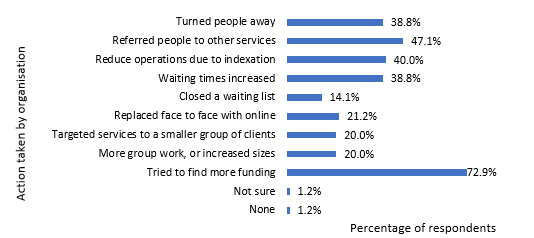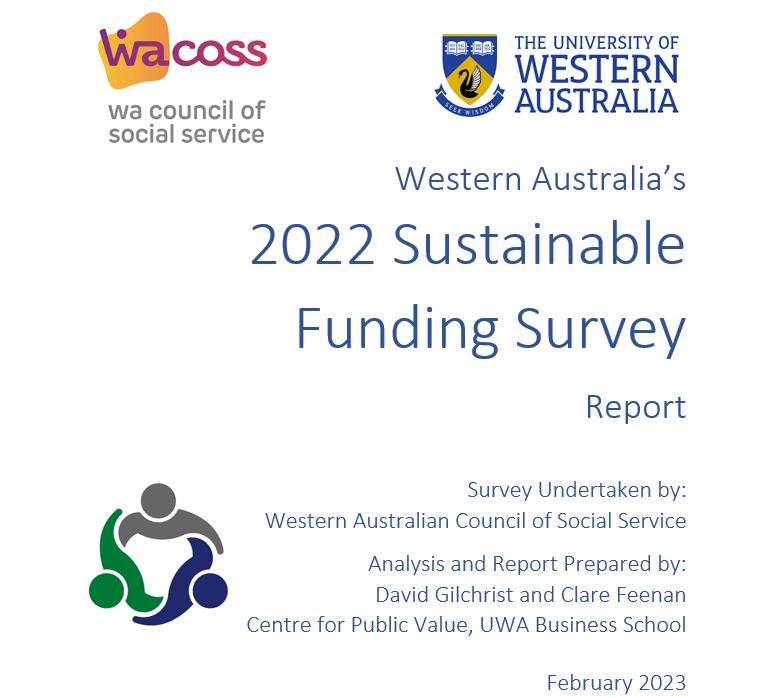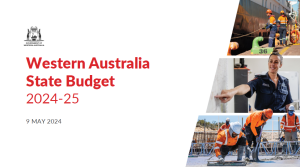The social services sector in Western Australia has been under significant financial pressure for some years. This issue has been widely noted and recognised. However, the data sets available to underpin our understanding of what is happening in this crucial area are poor due to a lack of investment. In turn, this lack of data and analysis negatively impacts policy makers’ understanding likely reducing policy quality as a result.
Because of the pressure being faced by the sector and the notable negative impacts on vulnerable people and communities, the Western Australian Council of Social Service (WACOSS) undertook a survey of member organisations at its own cost with a view to understanding the extent of the problems being faced and the impacts on sustainability to date and prospectively.
Overall, 87 organisations from across Western Australia responded to the survey which examined funding adequacy, the extent to which demand is being met, the administrative impacts of contractual arrangements and the decisions being taken by member organisations as a result, including impacting staffing and investment for service improvement and expansion. This report has been developed out of an analysis of the responses provided by those 87 organisations.
In examining the data, consideration was had to the indicators of risk to service sustainability which have been identified in earlier work. Importantly, when considering the issue of sustainability, the survival of member organisations is not the focus but, rather, the ability of the sector to continue to provide the right quantity of services at the right quality and at the right timing. As such, it is important to remember that this report is not about organisations providing services but about the impacts of inadequate funding policy on vulnerable people and communities.
Finally, the survey collected both quantitative and qualitative data. Throughout this report we have included comments directly from respondents in order to allow readers to appreciate the position that organisations are in.
In effect, the survey responses confirm that service sustainability is not only under threat but that service providers are having to react defensively in order to ensure those services that they do provide are of appropriate quality and are sustainable (defensive decision making). This means that the respondents have reported that they are reducing services as a result of under-funding. This in turn impacts ongoing service sustainability as staffing and financial sustainability reduce further—a never-ending spiral of responses to under-funding reducing capacity and service delivery.
Read the 2022 Sustainable Funding Survey Report
Key Findings
This report sets out the findings for the Western Australian Council of Social Services’ (WACOSS) Sustainable Funding Survey.
48% of WACOSS’ social service organisation members responded to the survey held in October and November 2022. The key findings from survey responses include:
- Inadequate funding over successive years has driven the social services sector into unsustainability.
- Short-, medium- and longer-term sustainability of social services is under threat in Western Australia due to a lack of appropriate commissioning approaches and inadequate indexation of contracts.
- Funding inadequacy was reported across ALL government funded contract service areas, with providers of Child Sexual Abuse Therapeutic Services reporting the biggest funding gap.
- 53% of respondents could not meet service demand in 2022.
- 78% of respondents reported staff burnout.
- 40% of respondents reported that they had reduced their operations in order to survive in 2022 thereby reducing services in a time of increased demand.
- 73% of respondents said they intend to reduce their services and 65% foreshadowed they will reduce their employee hours in 2023.
- In 2022, services were reduced using the following strategies (respondents could select all that applied):

Survey Undertaken by: Western Australian Council of Social Service
Analysis and Report Prepared by: David Gilchrist and Clare Feenan. Centre for Public Value, UWA Business School




